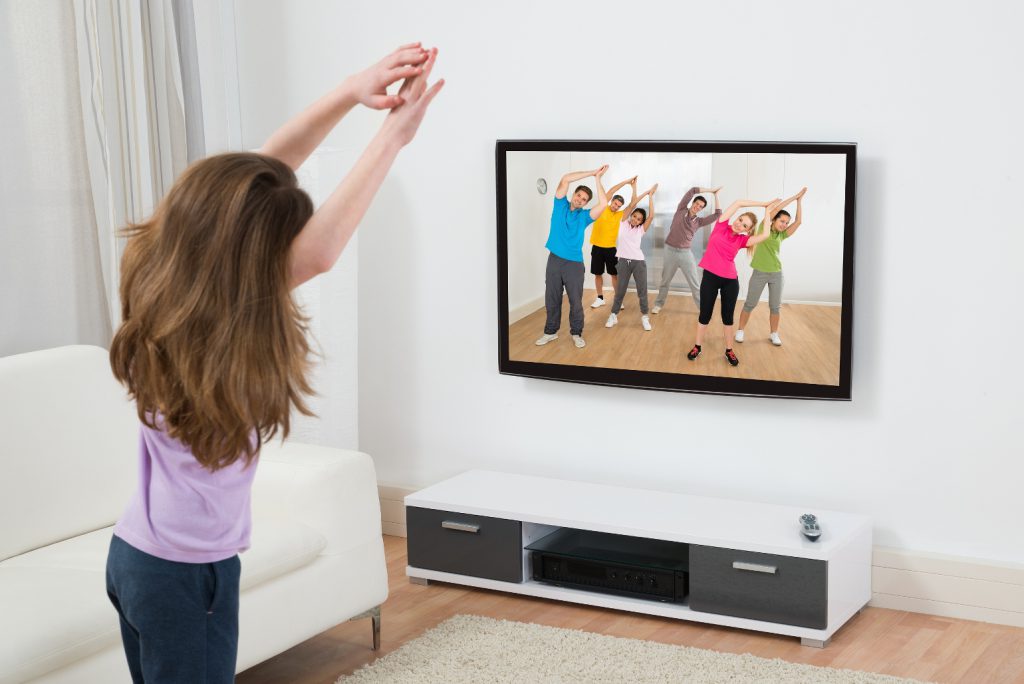Screen Time for Children: How Much Time Should Children Be Allowed to Spend in Front of a Computer or TV Screen?
Most children spend a good portion of their day in front of a screen, be it a TV set, PC, tablet or some other gadget. And while some of these activities are beneficial and educational, screen time for children should be carefully monitored so that excessive use can be discouraged.
Many parents are unaware of the dangers associated with too much screen time. Spending hours on end in front of a screen can affect children’s overall health, psychological development and sleep patterns. This is why it’s important for parents to limit the time their children spend on screen media and social networks.

 However, spending too much time in front of a computer or mobile screen is inadvisable. Especially if done close to bedtime, it can lead to sleep problems, attention issues and anxiety the following day. This is because the light emitted by electronic devices interferes with the body’s internal clock (blue light effect). Exciting electronic games before bedtime should be especially discouraged.
Keep in mind that violent imagery in games and movies can cause nightmares in sensitive children, so feel free to restrict access even if all of your child’s classmates are watching such content. Screen time increases the risk of childhood obesity as it is linked to unhealthy food choices and lack of exercise.
Last but not least, the lack of normal, real life social interaction can also present a problem. This, together with the exposure to age-inappropriate content (something that parents can’t always control) can lead to psychological changes and aggressive behavior later in life.
However, spending too much time in front of a computer or mobile screen is inadvisable. Especially if done close to bedtime, it can lead to sleep problems, attention issues and anxiety the following day. This is because the light emitted by electronic devices interferes with the body’s internal clock (blue light effect). Exciting electronic games before bedtime should be especially discouraged.
Keep in mind that violent imagery in games and movies can cause nightmares in sensitive children, so feel free to restrict access even if all of your child’s classmates are watching such content. Screen time increases the risk of childhood obesity as it is linked to unhealthy food choices and lack of exercise.
Last but not least, the lack of normal, real life social interaction can also present a problem. This, together with the exposure to age-inappropriate content (something that parents can’t always control) can lead to psychological changes and aggressive behavior later in life.
 Screen-free areas are also recommended by experts. This means no TV, computers or gadgets in children's bedrooms and no TV during meals. Screen time should be balanced with other activities, such as reading, puzzles, board games for the entire family and outdoor recreation.
Practice what you preach. If you want your children to understand that too much screen time is unacceptable, don’t check your email or watch TV while they are talking to you. That being said, the time spent in front of a computer isn’t necessarily wasted. On the contrary, computers can greatly facilitate the learning process.
Having that in mind, we carefully designed our interactive Kinder IQ online learning resources to help preschoolers and kindergarteners prepare for school in a fun and enjoyable way. The program focuses on the development of core skills such as math and language (considered essential for future academic achievements).
Still, beside the obvious advantages, computers are not the only learning tools. At Kinder IQ, we are fully aware of that. That’s why our range of products also includes a variety of fun and engaging printables, learning rewards, as well as skills worksheets organized by learning areas which can be printed and enjoyed at home.
Screen-free areas are also recommended by experts. This means no TV, computers or gadgets in children's bedrooms and no TV during meals. Screen time should be balanced with other activities, such as reading, puzzles, board games for the entire family and outdoor recreation.
Practice what you preach. If you want your children to understand that too much screen time is unacceptable, don’t check your email or watch TV while they are talking to you. That being said, the time spent in front of a computer isn’t necessarily wasted. On the contrary, computers can greatly facilitate the learning process.
Having that in mind, we carefully designed our interactive Kinder IQ online learning resources to help preschoolers and kindergarteners prepare for school in a fun and enjoyable way. The program focuses on the development of core skills such as math and language (considered essential for future academic achievements).
Still, beside the obvious advantages, computers are not the only learning tools. At Kinder IQ, we are fully aware of that. That’s why our range of products also includes a variety of fun and engaging printables, learning rewards, as well as skills worksheets organized by learning areas which can be printed and enjoyed at home.
How much time do children spend in front of a screen?
Children are spending increasing amounts of time on the internet, playing video games and watching TV, while the starting age continues to drop. In fact, modern day children spend more time watching TV than at school. In contrast to good old times when a single TV set was the only media device in the house, many children below the age of 6 now own a tablet, iPad or cell phone. On average, these gadgets occupy at least several hours of a child's day. According to statistics, children aged 8 to 18 spend as much as 8 hours a day engaged in these activities, which is far more than the time spent playing outside. Also, a lot of children chat or watch TV on cell phones and tablets after bedtime. Not surprisingly, this disrupts their sleep patterns and affects their efficiency and attention levels the following day.What's the reason for excessive media use?
There are several reasons why children spend so much time on their computers and cell phones. In this digital age, where media technology is omnipresent, it’s easy to understand why children become active users from a very early age. Also, many parents believe that computers and tablets can help with their children’s development and academic skills. This, coupled with the children’s increasing power to influence parent purchases, is the reason why many third graders walk around with expensive phones and tablets. Also, parents see screen media as a convenient source of entertainment for their children. And truth be told, we’ve all occasionally used the TV or tablet as a babysitter to get some peace and quiet after a hard day at the office or to do some work around the house.
Benefits and dangers associated with spending time in front of a screen
Computers are not all bad. According to certain studies, computer games can improve hand-eye coordination and eye-hand-keyboard-mouse dexterity. Fast decision-making skills can also be strengthened, since children have to think and respond quickly during the game. Computers can enhance the child's cognitive skills and learning capacity. As a result, they can be used as educational tools to increase school readiness in the core areas, including language and math. Computers can also help children with their classwork and homework activities. Regular use of screen media can increase children’s ability to multitask. Of course, the key here is to use high-quality, age appropriate media and content. However, spending too much time in front of a computer or mobile screen is inadvisable. Especially if done close to bedtime, it can lead to sleep problems, attention issues and anxiety the following day. This is because the light emitted by electronic devices interferes with the body’s internal clock (blue light effect). Exciting electronic games before bedtime should be especially discouraged.
Keep in mind that violent imagery in games and movies can cause nightmares in sensitive children, so feel free to restrict access even if all of your child’s classmates are watching such content. Screen time increases the risk of childhood obesity as it is linked to unhealthy food choices and lack of exercise.
Last but not least, the lack of normal, real life social interaction can also present a problem. This, together with the exposure to age-inappropriate content (something that parents can’t always control) can lead to psychological changes and aggressive behavior later in life.
However, spending too much time in front of a computer or mobile screen is inadvisable. Especially if done close to bedtime, it can lead to sleep problems, attention issues and anxiety the following day. This is because the light emitted by electronic devices interferes with the body’s internal clock (blue light effect). Exciting electronic games before bedtime should be especially discouraged.
Keep in mind that violent imagery in games and movies can cause nightmares in sensitive children, so feel free to restrict access even if all of your child’s classmates are watching such content. Screen time increases the risk of childhood obesity as it is linked to unhealthy food choices and lack of exercise.
Last but not least, the lack of normal, real life social interaction can also present a problem. This, together with the exposure to age-inappropriate content (something that parents can’t always control) can lead to psychological changes and aggressive behavior later in life.
How much screen time for children is okay and how can you manage it?
There are no clearly set limits to the amount of time a child can safely spend in front of a screen. Still, most experts agree that children under 2 should be kept away from all screen media. From the age of 3, children can have a few hours of screen time a day. These limits mostly apply to non-educational, free time exposure; not homework screen time which is often required for school purposes. Of course, you don’t have to count each minute your child spends online and you can allow some flexibility - just be vigilant. One way to keep screen time at an acceptable level is to restrict the use of computers, mobile phones and TV to a fixed weekly level. The type of content your child is exposed to is very important and it’s your job to monitor it. On that note, when it comes to children and movies, make sure you read the parental advisory section first. Just because a film has been approved for a certain audience doesn’t mean the content is always appropriate. It’s up to you to decide. Screen-free areas are also recommended by experts. This means no TV, computers or gadgets in children's bedrooms and no TV during meals. Screen time should be balanced with other activities, such as reading, puzzles, board games for the entire family and outdoor recreation.
Practice what you preach. If you want your children to understand that too much screen time is unacceptable, don’t check your email or watch TV while they are talking to you. That being said, the time spent in front of a computer isn’t necessarily wasted. On the contrary, computers can greatly facilitate the learning process.
Having that in mind, we carefully designed our interactive Kinder IQ online learning resources to help preschoolers and kindergarteners prepare for school in a fun and enjoyable way. The program focuses on the development of core skills such as math and language (considered essential for future academic achievements).
Still, beside the obvious advantages, computers are not the only learning tools. At Kinder IQ, we are fully aware of that. That’s why our range of products also includes a variety of fun and engaging printables, learning rewards, as well as skills worksheets organized by learning areas which can be printed and enjoyed at home.
Screen-free areas are also recommended by experts. This means no TV, computers or gadgets in children's bedrooms and no TV during meals. Screen time should be balanced with other activities, such as reading, puzzles, board games for the entire family and outdoor recreation.
Practice what you preach. If you want your children to understand that too much screen time is unacceptable, don’t check your email or watch TV while they are talking to you. That being said, the time spent in front of a computer isn’t necessarily wasted. On the contrary, computers can greatly facilitate the learning process.
Having that in mind, we carefully designed our interactive Kinder IQ online learning resources to help preschoolers and kindergarteners prepare for school in a fun and enjoyable way. The program focuses on the development of core skills such as math and language (considered essential for future academic achievements).
Still, beside the obvious advantages, computers are not the only learning tools. At Kinder IQ, we are fully aware of that. That’s why our range of products also includes a variety of fun and engaging printables, learning rewards, as well as skills worksheets organized by learning areas which can be printed and enjoyed at home. 